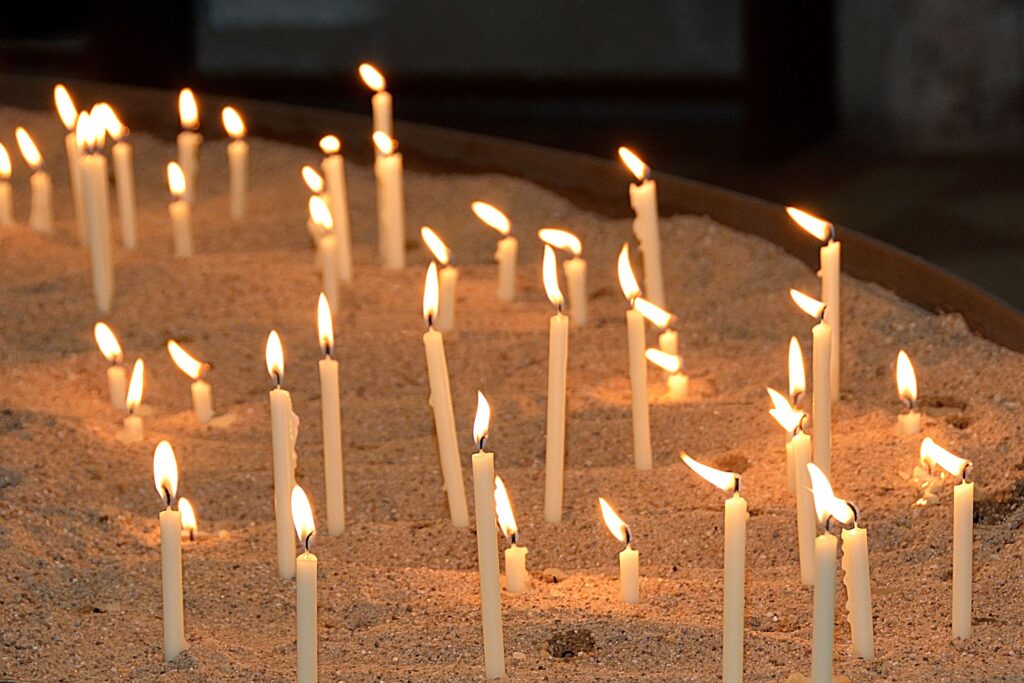How to plan a funeral on a budget

Dealing with the death of a loved one can be very difficult, no matter what your circumstances are. The rising cost of funerals means many families simply don’t have the money to cover the cost.
Abi Oborne, former Education Officer at Pilgrims Hospices, looks at the options available to plan a funeral on a budget.
At Pilgrims, we want to help those in our community access all the information they need to help them deal with issues around death and dying, no matter their financial circumstances.
I hope that this blog can give some simple ideas of how a funeral can be more affordable, helping to point families in the right direction in terms of seeking more in-depth support and advice.
It’s important to remember that how much you spend on someone’s funeral is not a measure of how much they are loved or valued by you.Abi Oborne, Pilgrims Hospices
In 2018, the average price of a funeral was around £3,757; many families in Britain are struggling to meet the cost. It can be particularly difficult when a death is sudden or unexpected, or when a family are already struggling on a low income but still want to give their loved one the best send-off they can manage. Here are some ideas for keeping the cost of a funeral down and what you can do if you’re unable to pay for a funeral.
Money isn’t everything
First of all, it’s important to remember that how much you spend on someone’s funeral is not a measure of how much they are loved or valued by you. There are ways that you can celebrate their life without getting into debt and there is help out there to guide you.
A first step might be to phone the Down to Earth advice helpline who can talk you through your options if you are struggling to finance a funeral. You can contact them on 020 8983 5055.
If there are no funds at all to pay for a funeral
If somebody dies and no one is able to pay for their funeral, it is the local authority’s responsibility to carry out a burial or cremation. This will generally be an unattended simple burial in a council-owned and managed cemetery. Some local authorities will use a crematorium instead of burial. In most cases, the grave will be unmarked, the burial unattended and there could be some delay in arrangements.
To find out more about this option it is best to contact your local council.
The Children’s Funeral Fund
There are specific funds available to help cover some of the cost of a child’s funeral if they were under 18. Check out the UK government’s Children’s Funeral Fund webpage for more information.
Getting a grant to help cover costs
There is a grant available from the Department for Work and Pensions (DWP) to help families on benefits pay for a funeral. Families can receive up to £1,300 depending on their circumstances. You can find out more about whether you might be eligible for this help on the UK government’s website.
Asking friends and family to help cover the cost
There is no shame in asking others to help and it is quite common now for people to set up online fundraisers to help in paying for a funeral. You could set up a GoFundMe memorial fundraising page and ask for people to contribute to the costs instead of sending floral tributes. People are often glad to help in some way and would like to support you.
Burial or cremation?
Burials cost considerably more than cremations; depending on your location and the services available, a burial can cost around £1,000 more. According to moneyadviceservice.org.uk, the average cost for a funeral involving a burial is £4,267 whereas the average cost for a funeral with a cremation is £3,247.
It’s worth looking at different options for burials. There are now many natural burial grounds that have reasonable prices and offer tree saplings, wildflowers or carved wooden markers for graves instead of more expensive headstones. These options also reduce the cost of grave maintenance for family members and loved ones.
Separating the burial or cremation from the service or celebration of life
Another way that families can keep costs down is by separating the celebration of the person’s life / their funeral service from the actual burial or cremation. A cremation can be unattended (this is called a direct cremation) and then the celebration or service can be held with the returned ashes instead of the coffin.
Direct cremation (Cost: £1,000 – £2,000)
In a direct cremation, your loved one’s body is taken to the crematorium in a simple coffin and their ashes are returned to you. The cremation will be unattended, and the time and day will be chosen by the crematorium, not by you.
A direct cremation is now widely offered by local funeral directors but does vary in price quite considerably, so it’s best to phone around to find out how much each will charge for a direct cremation and exactly what is included in that price. Ask if the price is totally inclusive or if there will be anything extra to pay for. This is a job you could ask a friend to do for you / with you as it can be quite overwhelming reading through a breakdown of prices, and it can also be hard to have to explain your situation over and over again. Lots of funeral directors offer a breakdown of their prices on their website so you can see quite clearly what you are paying for.
There are also some national companies that offer a direct cremation service. They will generally pick up your loved one’s body from the hospital or your home within a short period of time and return their ashes in around a week, although it is best to speak to the company directly about the details.
Celebration of life / memorial service
If the burial or cremation of the body is separate from the celebration or memorial service, the latter could then take place anywhere from a person’s home or garden to a local church or function room at a favourite pub, village hall or outdoor venue. This could essentially work as a service and wake combined, by doing something as simple as a celebration at home with the person’s favourite meal and a chance to chat over old photos. Or it could be a service led by a friend, family member, local vicar or celebrant. Your local vicar would hold a funeral or celebration service with the person’s ashes in your local church and the cost would be around £200.

The more you can do yourself, or by asking for help from friends and family, the more the costs can be kept to an affordable level. People often rally to help when somebody dies; some might get in touch and say, ‘Is there anything I can do?’ At this point, you could say yes and ask if they can bake a cake or make a tray of sandwiches to bring to the celebration. A friend with a computer and printer could help with the order of services and invitations to the celebration or could send invites out for you via text or email.
DIY funeral
Some people decide that they would like to arrange their loved one’s whole funeral themselves. This will include care of the body and transporting the body to the place of burial or crematorium, which can be done using an estate car or a larger vehicle. There will also be a lot of paperwork to manage. This option cuts out the cost of a funeral director entirely and will save you a great deal of money, however you will need some support to manage everything. Although DIY funerals are not very common, they can be done. Resources and advice are available from the Natural Death Centre if you would like to find out more about this option.
A traditional funeral: How to keep the cost down
After looking at all the options, you may decide on a more traditional funeral. This will cost around £3,500 or more depending on what your wishes are. To keep the costs manageable, it is a good idea to compare the prices and services of several different funeral directors to see what you feel most comfortable with. Be direct with the funeral director about what your budget is and don’t feel pressured to spend more than you can afford.
You could keep things very simple – no extra cars, just ask people to meet at the funeral venue. Instead of floral tributes, perhaps everyone could bring one bloom to place on the coffin in the service. You could ask friends and family to help you put on a simple funeral tea at home after the service.
Ask for help and support
Ultimately, don’t feel you have to plan a funeral on your own. There is support and advice out there to help you manage this. Invite a friend over to make the tea while you call advice lines and get all the information you can.
Remember: You are not alone if you’re struggling with the cost of a funeral.Abi
A note from Abi:
“When researching this blog, I spoke to several local funeral directors and services. They were all very understanding and not at all judgemental about the difficulties many families face when paying for a funeral. Most were happy to talk openly about money and to be flexible with the services they can offer.
Remember: You are not alone if you’re struggling with the cost of a funeral.
This is a problem we face as a whole society, due to families trying to get by on lower incomes whilst managing the rising costs of living. The price of a funeral has increased dramatically in the last ten years. With fewer people able to save and buy property, or having to use the value of their property to pay for their care, budgeting for a funeral and knowing your options will become ever more important.”
Abi Oborne was the former Education Officer at Pilgrims Hospices.
The views reflected here are her own.
Resources:
- The Big Conversation leaflet
- Children’s Funeral Fund
- GoFundMe memorial fundraising pages
- Natural Death Centre
- Quaker Social Action: Down to Earth service
- UK government funeral cost support
There’s much more to death than we think; what if it isn’t just an ending, but an event we can plan for? Thinking beyond the four walls of hospices and hospitals, we have the chance to approach it with confidence and plan a good death. After Wards is a collection of insights and ideas from people who can help us all to re-imagine this essential part of life, and to live well until we die.


